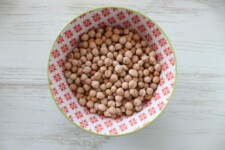Can Dogs Eat Coconut, Coconut Oil, and Coconut Milk?
Coconut is healthy, refreshing, and great tasting for humans, but what if your dog wants to chew on some?
Dogs are usually quite happy to chew into the meaty flesh of a coconut, and the fibrous husk is a great challenge for heavy chewers.
So, is coconut safe for your dog to eat?
The truth is, coconut is a safe fruit and dogs can eat it without health issues. Coconut has multiple health benefits for dogs, including digestion, and an improved immune system. However, not every part of a coconut is good for your dog.
In this article we will look at the three different parts of a coconut, and which ones have health benefits.
We’ll also discuss how much coconut to give your dog, and any potential side effects of coconut that you should be aware of.

Is Coconut Good For Dogs?
The most popular component of coconut is coconut oil, which is added to dog supplements both for its medicinal value and its pleasant scent.
Some dog owners even add small droplets of the oil to dog food to tickle their picky eater’s taste buds.
Coconut oil is highly valued due to its antibacterial and anti-fungal properties, which helps keep common diseases at bay.
It is sometimes used as a homemade antihistamine to reduce the severity of allergic reactions in dogs. It also helps in the digestion process.
Coconut milk is another nutritious fluid that is safe for dogs to drink.
It contains certain medium-chain fatty acids that help trigger regular bowel movements to relieve constipation in dogs.
While coconut oil and milk are nutrient-rich, much of the nutritional value is in the white coconut flesh.
This meaty part is grated to produce coconut milk. This flesh can be served raw either as a top-up to your dog’s meal or as a treat.
Can Dogs Drink Coconut Milk?
Coconut milk is safe for dogs to drink, as long as it is obtained from safe sources.
Be careful with store-bought coconut milk, and check for any additives such as sugar, artificial flavors, and preservatives that may be toxic to your dog.
Naturally, coconut milk is loaded with dozens of nutrients such as zinc, calcium, iron, and magnesium which improve the overall health of your dog.
When serving coconut milk to your dog, make sure it is the freshest you can find.
Can dogs eat coconut oil?
In the last few years, coconut oil has been hitting the headlines as a cure-all medicine.
While there is no scientific backing for coconut oil as a medicine for everything, coconut oil has produced positive results when applied to human hair and skin. The benefits are mostly external, and you can see the actual benefits after a few uses.
Coconut oil is safe and dogs can eat the oil – but in moderation.
Coconut oil has properties that may lead to weight gain and should only be served in small amounts.
Nutritionists and vets do not object serving coconut oil to dogs, and they agree that coconut oil has certain benefits to dogs.
Benefits Of Coconut For Dogs
Boost Their Immune System
Coconut is rich in antioxidants, which help boost your dog’s immune system and create a powerful response to foreign disease-causing microbes.
A strong immune system is necessary to promise an extra layer of defense against viruses, fungi, parasites, and bacteria, also helping with management of ringworm and other infections..
Decreases Inflammation
Coconut contains lauric acid, a type of medium fatty acid that has anti-inflammatory properties that can help reduce the severity of inflammatory symptoms.
The anti-inflammatory properties are also evident in helping reduce swelling in dogs.
Most dog owners say that serving a small piece of coconut during mealtime helps speed the healing of wounds and cuts, also helping swelling associated with arthritis.
- However, note that coconut should not be used as the actual treatment for wounds, cuts or arthritis.
It can be used in managing the symptoms and speeding up healing, after getting veterinary treatment for the main condition.
Good For Their Skin
Whether you are serving your dog coconut oil or just the meaty part, you are guaranteed to see some positive change in their skin condition.
The lauric acid helps reduce skin swelling, infections, and flea allergies that make the dog’s coat appear bumpy.
You can also use coconut oil as a moisturizer on the dog’s skin after bath, to reduce coat dryness and itchiness.
How Much Coconut Is Too Much For Your Dog?
Dogs do not need fruits such as coconut to get their nutrients, and therefore, coconut should not be given in large qualities. Giving your dog too much coconut can cause stomach upset and indigestion in the short term.
Serve your dog only a small amount of coconut either as a treat or by adding grated coconut to their meal.
Dice the coconut or grate a small piece of the coconut and sprinkle it into your dog’s meal.
If you prefer giving them coconut oil rather than the meat, a few drops of the oil is enough.
The coconut oil will provide all the benefits that your dog would get from eating the actual coconut, and a few drops into his meal can serve the intended purpose.
What To Do If Your Dog Eats Coconut
Sometimes, dogs can get mischievous and steal coconut from the grocery bag.
If you caught your dog eating coconut, it should not be a cause for alarm since coconut is safe for dogs to eat.
The worst that can happen if they eat too much of the meaty part of the coconut is a stomach upset.
If your dog experiences discomfort, try getting them to drink water to help manage the discomfort.
If you caught your dog eating the whole coconut and is in the act of breaking the husk, you should intervene immediately. Swallowing husks can cause blockage of the gut and even choking, which can be fatal if not addressed quickly.
Quickly take the coconut away from your dog and check if the coconut shell is broken.
Check their mouth for any big bites of coconut and shells, and ask them to remove them in a way that he understands.
If they are hesitant, you should provide their favorite treat to encourage them to remove the coconut shell in their mouth.



